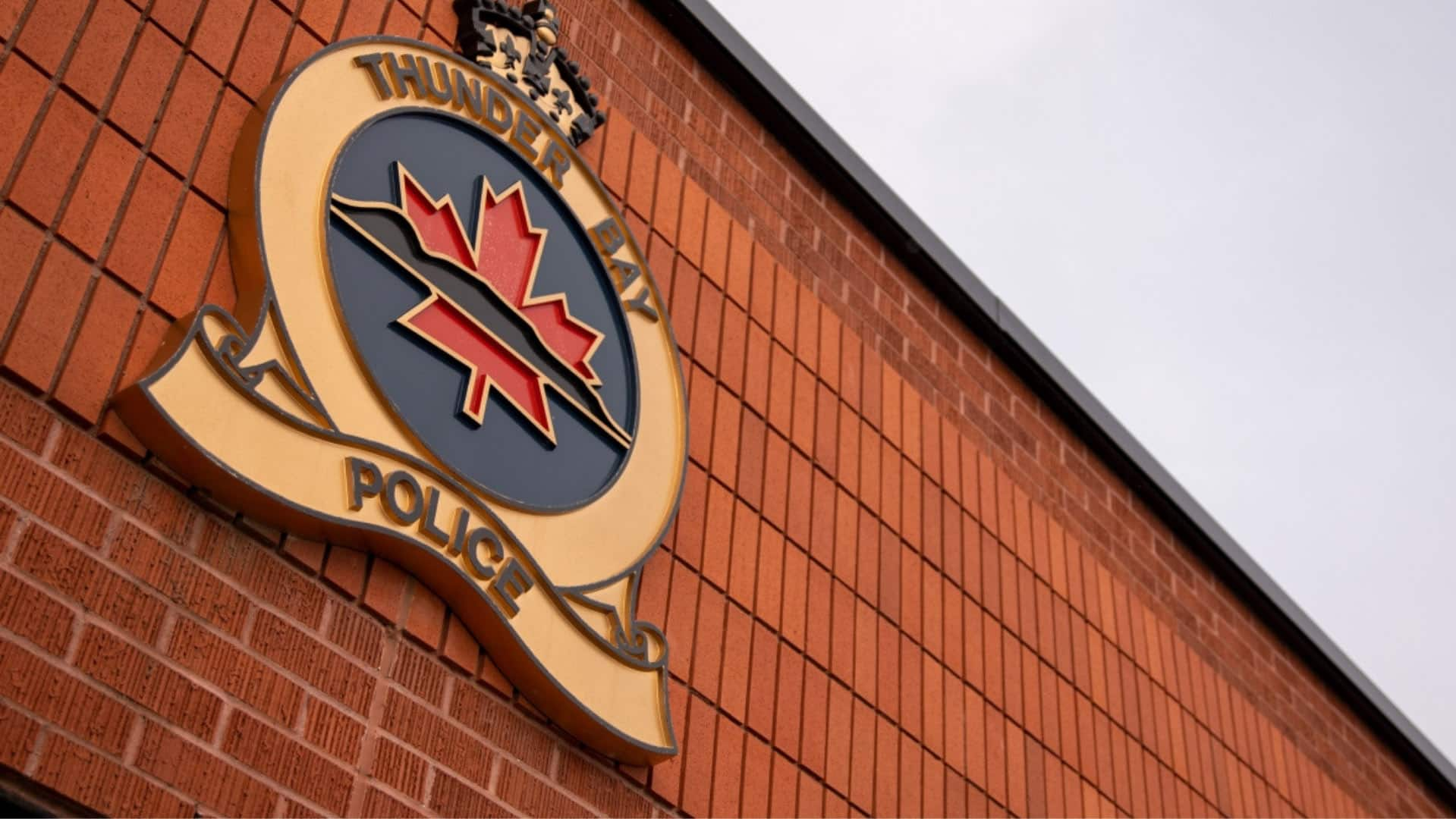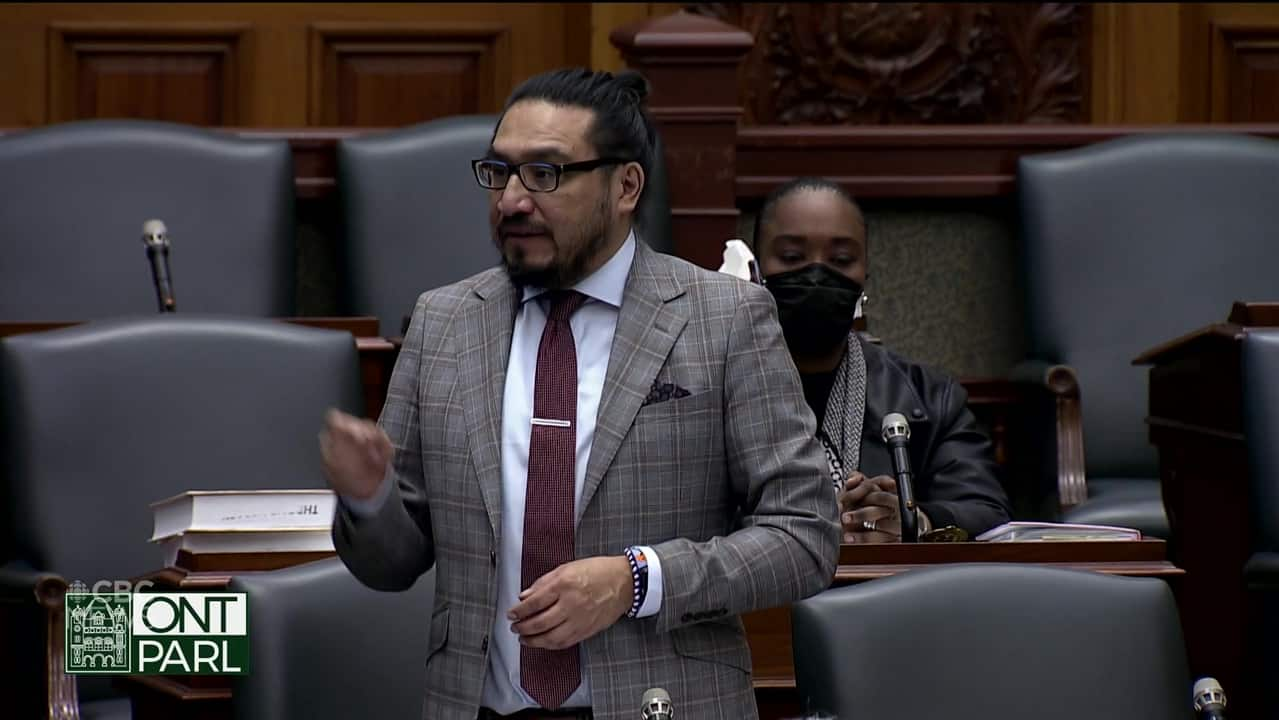First Nations leaders in northern Ontario are calling for the Thunder Bay Police Service (TBPS) to be disbanded and subject to provincial oversight, with a Nishnawbe Aski Nation deputy grand chief saying she’s lost faith that police will serve the community.

Calls to reinvestigate sudden deaths of Indigenous people in Thunder Bay, Ont.
A team reviewing sudden deaths in Thunder Bay, Ont., is calling on the city’s police force to reopen investigations into how multiple Indigenous people died between 2006 and 2019. 2:10
First Nations leaders in northern Ontario are calling for the Thunder Bay Police Service (TBPS) to be disbanded and subject to provincial oversight, with a Nishnawbe Aski Nation deputy grand chief saying she’s lost faith that police will serve the community.
“It’s quite evident that they’re not fulfilling their responsibility and their role, and that needs to change,” said Anna Betty Achneepineskum, a deputy grand chief with the Nishnawbe Aski Nation, a political organization that represents 49 First Nations across Treaty 9 and Treaty 5 in the province.
“There are many people who have lost faith that they will get justice,” Achneepineskum said in an interview with CBC News.
Achneepineskum said she no longer has hope the police service will meaningfully address the systemic racism toward Indigenous people that’s documented in reports by several police oversight agencies.
“In the last five years, when the reports came out, there was enough evidence and documentation to say that change needs to happen and we keep getting these statements that deny, that minimize and possibly justify what has taken place. That’s not enough.”
Others echoing Achneepineskum’s call include the Ontario NDP’s Indigenous and treaty relations critic, and a lawyer who has advocated for Indigenous families in Thunder Bay for decades.
Reinvestigate 14 deaths, report says
The demand for drastic change comes just days after a report for Ontario’s attorney general, completed by a team of provincially appointed investigators who spent years looking through TBPS sudden death investigations, was leaked to some news organizations, including CBC News.
The report details serious concerns with the investigations of 14 Indigenous people who died suddenly in the city between 2006 and 2019, with investigators saying they should be reinvestigated. Two other cases, with similar investigative concerns, should go for a coroner review or inquest, and another 25 unresolved cases of missing and murdered Indigenous women and girls (MMIWG) cases in Thunder Bay should be reviewed, according to the investigators.
That’s at least 41 cases, and there could be more.
The report begins with the disclaimer: “Due to finite timelines and resources allocated to the process outlined in this report, cases provided here are not an exhaustive list,” adding there may be other sudden death cases that “warrant further investigation.” It ends with the recommendation for an external audit of all death investigations in the police department’s record management system.
“I see their faces, and also others who have died on the streets and rivers in Thunder Bay, where it was quite obvious their deaths were not investigated,” said Achneepineskum, adding she knows many of the cases.
“It says to us that we are not worthy of our death being investigated.”

What happens next with those cases is up to Ontario’s attorney general, who received the report on March 2 and is still determining what to do with it, according to a ministry spokesperson.
As he considers next steps, at least 41, mostly Indigenous, families wait, not knowing the deaths of their loved ones may be reinvestigated or reviewed, or if there will be another crack at responding to the questions left unanswered by the original TBPS investigations.
Police chief defends force
The call for disbandment comes at a particularly turbulent time for Thunder Bay’s police force.
It faces at least nine human rights complaints from current or retired employees. The Ontario Provincial Police and the Special Investigations Unit (SIU) have both announced investigations into criminal conduct by unnamed police officers. The chief, the now-suspended deputy chief, the police lawyer and administration of the force are being investigated by the Ontario Civilian Police Commission (OCPC), a watchdog agency with the legislated authority to disband a police service and fire police leadership.

Still, police Chief Sylvie Hauth said the people of Thunder Bay can “100 per cent” trust the TBPS going forward.
“I have said publicly that I will co-operate 100 per cent fully with all the investigations that are currently underway. You need to let due process take place, and for me and all the members of my service, public safety is paramount. We are here. We have a job to do.”
Hauth said she has been working to build better relationships with Indigenous people in the city and improve the quality of policing, and has taken specific steps including establishing a major crimes unit and rebuilding the community inclusion team.
“There’s a lot of things in the last few years where we’ve evolved. We’ve been very mindful, we’ve been very open and we’ve wanted to ensure that our approach is respectful.”
LISTEN | CBC interviews Thunder Bay police Chief Sylvie Hauth:

13:06Sylvie Hauth: Broken Trust Report
Human rights complaints…external probes…now, calls for more re-investigations of sudden death cases in Thunder Bay. Hear from Thunder Bay Police Chief Sylvie Hauth as well an exchange between Kiwetinoong NDP MPP sol Mamakwa and Solicitor-General Sylvia Jones. 13:06
As to the investigative deficiencies documented in the report — which included investigations left incomplete, key leads ignored, and important suspects and witnesses not thoroughly interviewed — Hauth said it’s important to understand the context and the changes with the service and provincial legislation, even in recent years.
“Many changes were done internally and our service continued to evolve and really kind of look, not only at the recommendations [from external reports], but at the resources that we have, our approach, our policies, really to ensure that we are more effective in the way that we police, we investigate, and ensuring that we provide the best service that we can.”
The leaked report summarizing the findings of the nine Broken Trust investigations noted numerous issues with the way Thunder Bay police handled death investigations. But it found that in the nine cases that were reinvestigated: eight findings remained unchanged from previous investigations and one cause of death was changed to undetermined.
If this were disclosed about the Toronto Police Service, there’d be a commission of inquiry faster than you could shake a stick– Julian Falconer, lawyer
Those findings don’t surprise lawyer Julian Falconer, who has been leading efforts to hold Ontario police accountable for three decades.
“These matters end up as cold cases, irreparably prejudiced. And so that’s what we’re facing here — a mountain of incompetent, racist work in which it’s going to be very difficult to bring the families any kind of peace,” he said to CBC News in an interview.
It is still important to try, Falconer said, adding he’s more concerned about what will happen the next time an Indigenous person dies in the city.

“Each day that passes that the Thunder Bay Police Service is permitted to investigate, another Indigenous death is another case that will be the subject of a report asking for a reinvestigation,” Falconer said. “Who are we fooling?”
Falconer represents the family of Stacy Debungee, whose 2015 death in Thunder Bay is now being reinvestigated by the OPP after serious deficiencies were found in the original TBPS investigation.
“There is a prospect from a competent police investigation of giving some peace, some comfort to a family on what happened to their loved one. They’ve been robbed of that, and this is being perpetuated on an ongoing basis.”
Calls to bring in the OPP
He said the only answer is to disband the service and create a police service that is accountable beyond the borders of Thunder Bay — in other words, bring in the OPP.
“If this were disclosed about the OPP, if this were disclosed about the Toronto Police Service, there’d be a commission of inquiry faster than you could shake a stick.”
The NDP’s provincial critic for Indigenous and treaty relations and MPP for the northern Ontario riding of Kiiwetinoong agrees.
“Racism kills. As Indigenous people, we live it and we die from it,” Sol Mamakwa, a member of the Kingfisher First Nation, told the Ontario Legislature, as he called on the government to order a commission of inquiry and direct OPP oversight of the police service until the inquiry is complete.
WATCH | NDP MPP Sol Mamakwa calls for inquiry, OPP oversight:

Ontario NDP MPP Sol Mamakwa calls for inquest and OPP oversight of Thunder Bay Police
Ontario NDP MPP Sol Mamawka spoke about the findings of systemic racism within the police force in Thunder Bay, Ont., and is asking the government for an inquest and Ontario Provincial Police oversight of the police service. Here’s his exchange in Queen’s Park with Solicitor General Sylvia Jones. 3:58
Ontario Solicitor General Sylvia Jones did not provide a yes or no response to Mamawka’s question at Queen’s Park on Wednesday. Instead, Jones pointed to her Jan. 22 decision, asking the OCPC to “thoroughly investigate the Thunder Bay police and the police services board,” and said she would allow them to continue that work.
CBC News has reached out to several other Indigenous leaders in the region and those who work with vulnerable people for this story, but they either declined to comment or wanted to wait before speaking publicly.
2nd OCPC investigation in 5 years
This is the second time in five years the same commission has investigated the police board.
The first time, retired senator Murray Sinclair released a report in 2018 leading to the temporary dissolution of the entire police board and the controversial, one-year appointment of Toronto-based lawyer Thomas Lockwood to run the service.
The Sinclair report offered a roadmap in the form of 45 recommendations for the TBPS and its oversight board to improve the quality of its policing services and address “a broader, deeper and more systemic level of discrimination in which an unacceptable status quo is viewed as the normal state of affairs.”

When Lockwood announced his departure from the police board in June 2020, he said he was confident in the board to implement the recommendations, and in the chief and deputy chief to improve policing and relationships with Indigenous people in the city.
Less than 18 months later, the chief, deputy chief and oversight board are all under another investigation by the same body, and the oversight board has hired an expert panel to help it implement those recommendations and address other concerns raised by the mounting human rights complaints and external investigations.
“And what does [the solicitor general do]? She sends it right back to the OCPC,” Falconer said.
For Falconer, Achneepineskum and Mamawka, there is just one answer: disband the force.
“Shut it down. Period,” Falconer said. “How much more evidence do we need? How many more layers do you need to peel back to understand that the rot runs deep, that issues of racism and incompetence lie at the heart of the service?”
Achneepineskum said they are looking to speak with Ontario’s solicitor general and other officials to discuss next steps. But above all, the deputy grand chief added it must be the families that remain at the heart of this process.
“We are going to stand with them to seek justice for their loved ones.”

